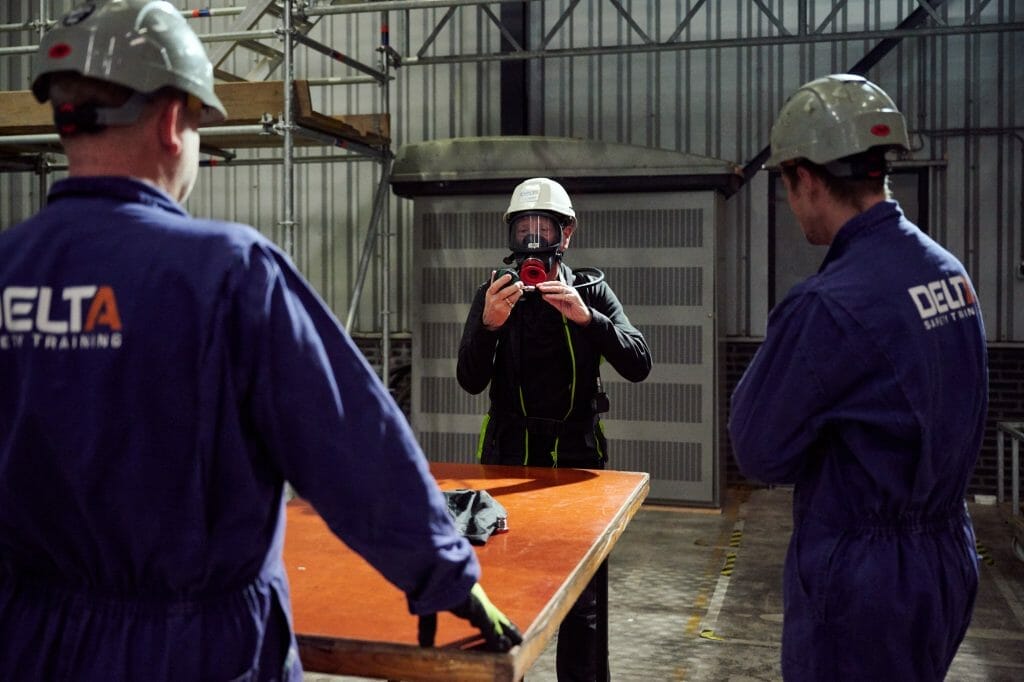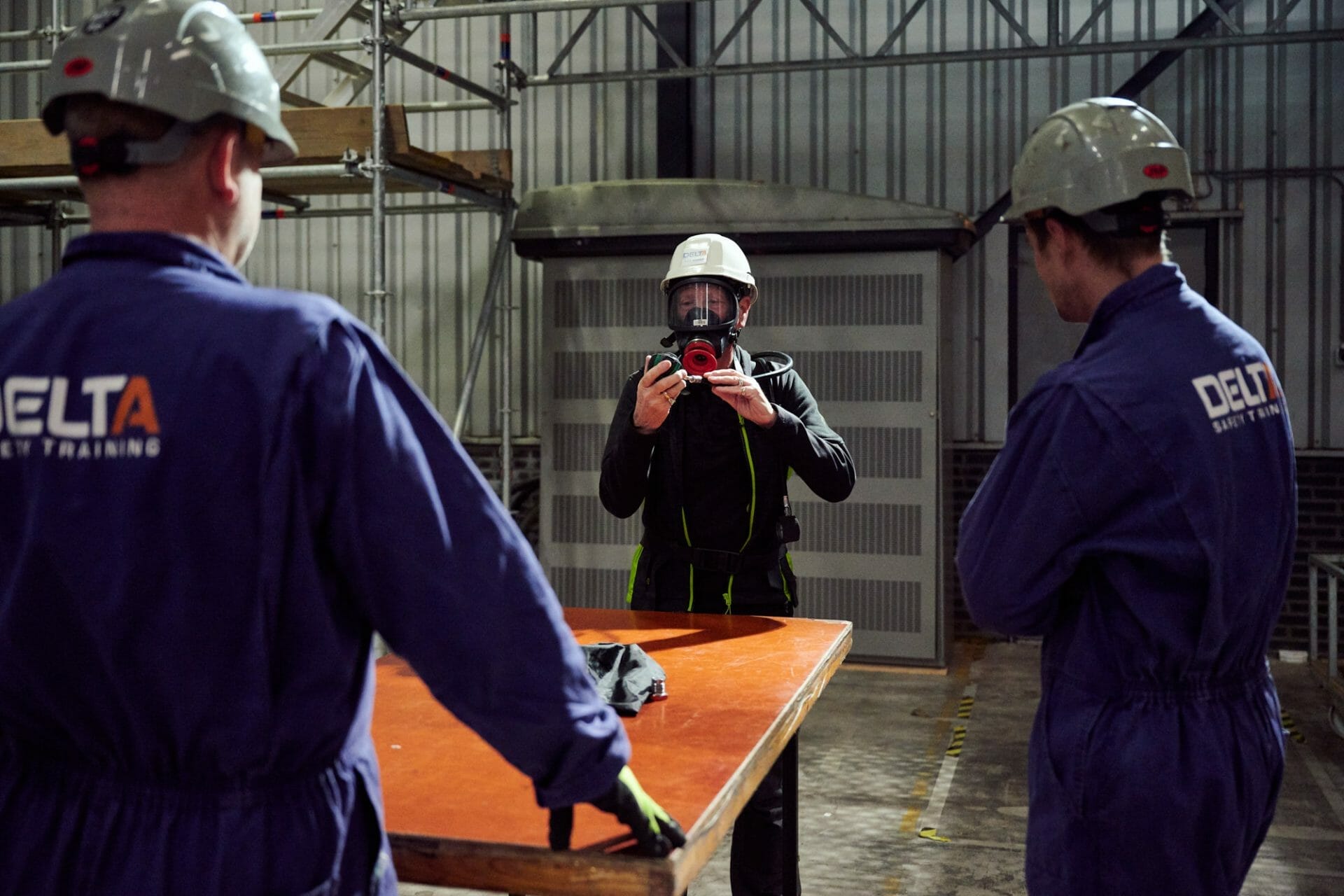| certificate |
DELTA
SOG + € 80,00 |
| validity | 3 years |
| costs | € 425,00 |
| STAP | No |
| learning form | Classroom |
| duration | 2 days |
| language | Dutch |
| location |
Geyssendorfferweg 47 3088 GJ Rotterdam |
| starting dates |
|
Book this training
book nowIndependent Respiratory Protection Basic
The two-day basic course (consecutive days) Working with Independent Respiratory Protection (SCBA) is meant for employees who must be able to use compressed air with a SCBA on a (petro)chemical company site. This applies to both breathing apparatus and airline systems (fixed and mobile). During this training, participants learn which respiratory protection devices there are, how a respiratory unit and the multiple-hours connection (also called living air) work and how they can use them to carry out work safely.
-
Contents Independent Respiratory Protection Basic
The basic training course on Independent Respiratory Protection consists of a theoretical and a practical part.
Theory
- Respiratory protection general
- Self-contained breathing apparatus
- Hose devices
- Selection of respiratory protective devices
- Working in confined spaces
- Monitoring and daily maintenance
- Safety measures
Practice
- Safe use and connection of the equipment
- Various practical exercises on the breathing apparatus training track
-
Basic training in Independent Respiratory Protection
This training is a basic training, intended for people who have not worked with self-contained breathing apparatus before, or do not (or no longer) have a valid self-contained breathing apparatus diploma.
Do you have a valid self-contained breathing apparatus diploma, but it will expire soon? Then book a refresher training. -
In what language is the Independent Respiratory Protection Basic taught?
DELTA Safety Training can also offer this course, in addition to Dutch, in other languages. Please contact contact us..
In addition to Dutch, the SOG exam can also be taken in German, English, Polish, Portuguese and Romanian.
Please indicate this in the comments section of the booking form. -
What are the admission requirements for the Independent Respiratory Protection Basic?
- Minimum age 18 years
- Valid breath or compressed air examination (see overview of medical examinations we provide)
- Participants must have a clean-shaven face during the course. If this is not the case, the student may be excluded from participating in the examination, as the face mask will not fit the face properly.
- If SOG exam - valid diploma B-VCA or VOL-VCA
-
What do I take to Independent Respiratory Protection Basic?
- Valid identification, choice of:
- Passport
- Identity card
- Driving licence
- Valid medical certificate
- Personal protective equipment (work clothes, safety shoes, helmet and gloves)
- Valid identification, choice of:
-
Is a medical examination necessary for me to do my job?
Yes! The Safe Working with Independent Respiratory Protection certificate is only valid in combination with a valid medical certificate from one of the examinations listed below.
In addition, a valid medical certificate is also required to participate in the training.- Breathing air inspection
- Compressed air inspection
If you do not yet have a valid medical examination, we can help you schedule one.You can indicate this in the comments field of the booking form or contact contact us.For a complete overview of medical examinations please visit our medical examinations page. -
What is included in the price of the Independent Respiratory Protection Basic?
- Digital certificate as proof of completion. A paper certificate will be not sent by default. However, if desired, you can receive a paper certificate at an additional cost of €25 excluding VAT. Read our blog article for more information.
- Fully catered lunch
- Coffee and tea
- Course material
- Exam
(Please note: The SOG exam has an additional cost. If you want a SOG exam, please select it in the booking form).
Frequently asked questions (FAQs)
-
When should I use self-contained breathing apparatus?
If you can no longer meet the requirements for dependent breathing protection including filters, you must use independent breathing protection. -
Do I need independent respiratory protection?
You need independent breathing protection if you work in environments where there is insufficient oxygen in the air, where there is a risk of a shortage of oxygen in the air, where there are hazardous substances in the air you breathe or where there is excessive air pollution. -
Are there different types of self-contained breathing apparatus?
Yes, there are different types of respiratory protection. There are 3 types of self-contained breathing protection: closed-circuit breathing apparatus, breathing apparatus and breathing airline net. Closed-circuit breathing apparatus are escape masks that allow you to escape from emergency situations. Breathing apparatus contains pressurised air. These cylinders can run out of air, so pay attention to that. Breathing air supply network is a system that provides you with clean air through a breathing air, - piping network, - buffer station or life support unit. You receive breathing air through hoses. There is no limit to the air. -
What is the main difference between dependent and independent respiratory protection?
With dependent breathing protection you are dependent on ambient air, with independent breathing protection you are not dependent on ambient air. -
What is independent respiratory protection?
Independent breathing protection is called "independent" because it is not dependent on the ambient air. You use independent breathing protection if the ambient air is toxic or polluted. You must use independent breathing protection when hazardous substances are present and there is no or too little oxygen. There are legal agreements about when independent breathing protection must be used. -
How long is my independent respiratory protection certificate valid?
The certificate is valid for three years. -
Do I need to have a medical examination before participating in the independent respiratory training?
Yes, you must be able to show a valid compressed air medical examination at the start of training. -
How do you determine which respiratory protection you need?
There are several risks to consider when choosing a good respirator. For example, you should pay attention to the type of substances present in the air, their concentrations and their properties. But also: how long will the employee have to work in this air? Is it a one-off task or do they have to work in it frequently? And does the employee have to perform physically demanding work?
-
DELTA
More information -
SOG
More information
Book this training
book now- Contact details
- Name and date of birth of students
Can't find the right data? Please contact us.
This training can also be booked in company, please ask us for the possibilities.



